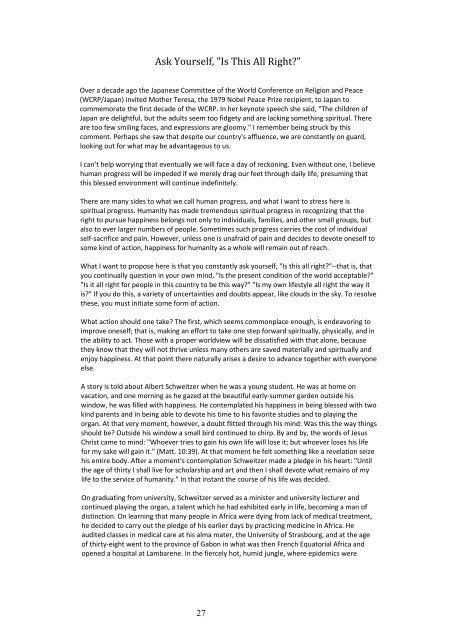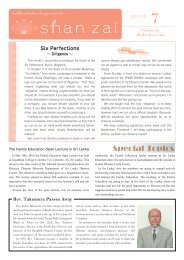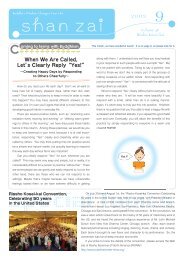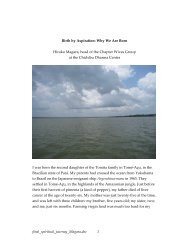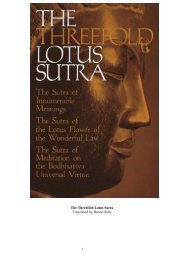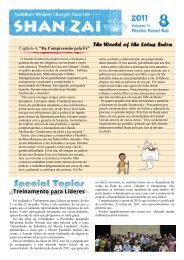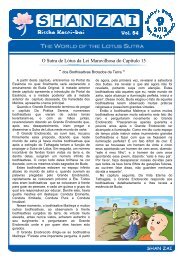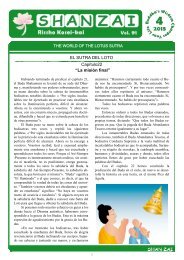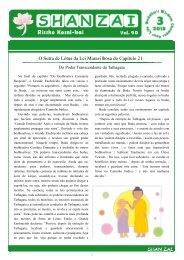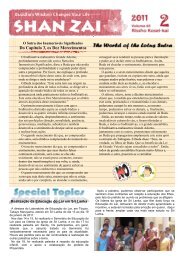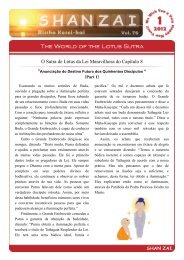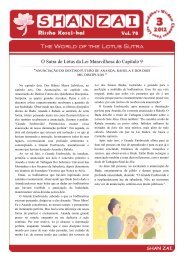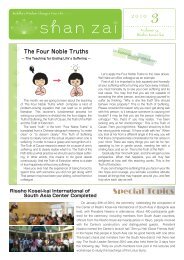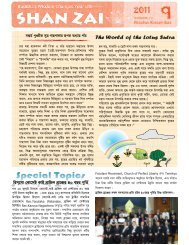You also want an ePaper? Increase the reach of your titles
YUMPU automatically turns print PDFs into web optimized ePapers that Google loves.
Ask Yourself, "Is This All Right?"Over a decade ago <strong>the</strong> Japanese Committee of <strong>the</strong> World Conference on Religion and Peace(WCRP/Japan) invited Mo<strong>the</strong>r Teresa, <strong>the</strong> 1979 Nobel Peace Prize recipient, <strong>to</strong> Japan <strong>to</strong>commemorate <strong>the</strong> first decade of <strong>the</strong> WCRP. In her keynote speech she said, "The children ofJapan are delightful, but <strong>the</strong> adults seem <strong>to</strong>o fidgety and are lacking something spiritual. Thereare <strong>to</strong>o few smiling faces, and expressions are gloomy." I remember being struck by thiscomment. Perhaps she saw that despite our country's affluence, we are constantly on guard,looking out for what may be advantageous <strong>to</strong> us.I can't help worrying that eventually we will face a day of reckoning. Even without one, I believehuman progress will be impeded if we merely drag our feet through daily life, presuming thatthis blessed environment will continue indefinitely.There are many sides <strong>to</strong> what we call human progress, and what I want <strong>to</strong> stress here isspiritual progress. Humanity has made tremendous spiritual progress in recognizing that <strong>the</strong>right <strong>to</strong> pursue happiness belongs not only <strong>to</strong> individuals, families, and o<strong>the</strong>r small groups, butalso <strong>to</strong> ever larger numbers of people. Sometimes such progress carries <strong>the</strong> cost of individualself‐sacrifice and pain. However, unless one is unafraid of pain and decides <strong>to</strong> devote oneself <strong>to</strong>some kind of action, happiness for humanity as a whole will remain out of reach.What I want <strong>to</strong> propose here is that you constantly ask yourself, "Is this all right?"‐‐that is, thatyou continually question in your own mind, "Is <strong>the</strong> present condition of <strong>the</strong> world acceptable?""Is it all right for people in this country <strong>to</strong> be this way?" "Is my own lifestyle all right <strong>the</strong> way itis?" If you do this, a variety of uncertainties and doubts appear, like clouds in <strong>the</strong> sky. To resolve<strong>the</strong>se, you must initiate some form of action.What action should one take? The first, which seems commonplace enough, is endeavoring <strong>to</strong>improve oneself; that is, making an effort <strong>to</strong> take one step forward spiritually, physically, and in<strong>the</strong> ability <strong>to</strong> act. Those with a proper worldview will be dissatisfied with that alone, because<strong>the</strong>y know that <strong>the</strong>y will not thrive unless many o<strong>the</strong>rs are saved materially and spiritually andenjoy happiness. At that point <strong>the</strong>re naturally arises a desire <strong>to</strong> advance <strong>to</strong>ge<strong>the</strong>r with everyoneelse.A s<strong>to</strong>ry is <strong>to</strong>ld about Albert Schweitzer when he was a young student. He was at home onvacation, and one morning as he gazed at <strong>the</strong> beautiful early‐summer garden outside hiswindow, he was filled with happiness. He contemplated his happiness in being blessed with twokind parents and in being able <strong>to</strong> devote his time <strong>to</strong> his favorite studies and <strong>to</strong> playing <strong>the</strong>organ. At that very moment, however, a doubt flitted through his mind: Was this <strong>the</strong> way thingsshould be? Outside his window a small bird continued <strong>to</strong> chirp. By and by, <strong>the</strong> words of JesusChrist came <strong>to</strong> mind: "Whoever tries <strong>to</strong> gain his own life will lose it; but whoever loses his lifefor my sake will gain it." (Matt. 10:39). At that moment he felt something like a revelation seizehis entire body. After a moment's contemplation Schweitzer made a pledge in his heart: "Until<strong>the</strong> age of thirty I shall live for scholarship and art and <strong>the</strong>n I shall devote what remains of mylife <strong>to</strong> <strong>the</strong> service of humanity." In that instant <strong>the</strong> course of his life was decided.On graduating from university, Schweitzer served as a minister and university lecturer andcontinued playing <strong>the</strong> organ, a talent which he had exhibited early in life, becoming a man ofdistinction. On learning that many people in Africa were dying from lack of medical treatment,he decided <strong>to</strong> carry out <strong>the</strong> pledge of his earlier days by practicing medicine in Africa. Heaudited classes in medical care at his alma mater, <strong>the</strong> University of Strasbourg, and at <strong>the</strong> ageof thirty‐eight went <strong>to</strong> <strong>the</strong> province of Gabon in what was <strong>the</strong>n French Equa<strong>to</strong>rial Africa andopened a hospital at Lambarene. In <strong>the</strong> fiercely hot, humid jungle, where epidemics were27


